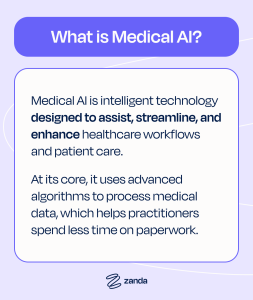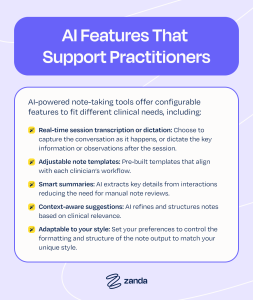The Documentation Dilemma: More Notes, Less Time
Every health practitioner knows the drill: hours each week spent documenting patient encounters, ensuring compliance, and keeping records airtight.
But at what cost?
Studies show that physicians spend nearly 50% of their workday on their EHR. Time that could be spent delivering care, growing the practice, or simply recharging.
This documentation overload fuels burnout, reduces face-to-face patient interaction, and cuts into revenue.
Enter Medical AI – a game-changing shift for practitioners who want to work more efficiently. AI-powered tools are reshaping how clinicians manage notes, handle tedious tasks, and manage their time. With the right AI-driven solution, documentation can be virtually effortless and seamlessly integrated into workflows.
What is Medical AI?
Medical AI is intelligent technology designed to assist, streamline, and enhance healthcare workflows and patient care. At its core, it uses advanced algorithms to process medical data, which helps practitioners spend less time on paperwork.
AI is revolutionizing the way notes are created, managed, and analyzed.
Key functions include:
- Natural Language Processing (NLP): AI transcribes, contextualizes, and generates clinical notes in real time to turn conversations into structured records without manual inputs.
- Data Extraction & Organization: AI identifies critical details from notes, lab results, and medical histories, structuring them for simplified interpretation and decision-making.
- Predictive Analytics: AI helps assess patient risks and potential interventions by recognizing patterns in documentation, offering insights that support proactive care.
Real-World AI in Action
AI-driven documentation tools are already transforming practices.
Clinicians can use voice-to-text AI to dictate notes hands-free, automate summaries to cut down charting time, and improve healthcare documentation accuracy.
The result? Fewer hours spent on admin and more time for patients.
The Power of AI for Medical Notes
Accurate and well-organized clinical notes are essential for delivering consistently high-quality care, but they can be one of the most time-consuming aspects of service delivery.
AI-powered tools are changing this. They can automate transcription, improve accuracy, and ensure greater consistency in medical records–without adding to your workload.
Automating Transcription and Real-Time Note Generation
AI-driven transcription tools capture patient conversations in real time, which eliminates the need for manual note-taking. These systems use Natural Language Processing (NLP) to transcribe, summarize, and structure notes instantly so clinicians can stay present with their patients.
Key benefits of AI for medical notes:
- Faster documentation: AI-generated notes cut charting time, freeing practitioners to focus on care (and self-care).
- More accurate records: AI can help reduce errors and inconsistencies in documentation.
- Consistent formatting: Standardized, structured notes make it easier to understand patient history.
AI Features That Support Practitioners
AI-powered note-taking tools offer configurable features to fit different clinical needs, including:
- Real-time session transcription or dictation: Choose to capture the conversation as it happens, or dictate the key information or observations after the session.
- Adjustable note templates: Pre-built templates that align with each clinician’s workflow.
- Smart summaries: AI extracts key details from interactions, reducing the need for manual note reviews.
- Context-aware suggestions: AI refines and structures notes based on clinical relevance.
- Adaptable to your style: Set your preferences to control the formatting and structure of the note output to match your unique style.
How Different Practitioners Benefit from AI for Medical Notes
AI isn’t just for one type of healthcare provider. It’s transforming workflows across professions.
- Physiotherapists: AI-generated treatment notes help ensure accurate progress tracking and standardized assessments.
- Psychologists: Use AI for medical documentation to streamline session notes, making it easier to focus on therapy.
- Speech Therapists: AI-assisted notes capture progress and therapy goals without manual transcription.
Built for Healthcare: AI Security and Compliance
In healthcare, security is critical, and it’s usually the main concern for practitioners when implementing AI-powered systems.
AI for medical documentation tools must comply with HIPAA and global privacy standards so patient data stays protected.
For example, Zanda has in-platform BizzyAI: Scribe, which encrypts and safeguards patient information following best-in-class security measures:
- End-to-end encryption: Protects patient data at every stage.
- HIPAA & GDPR compliance: Meets strict healthcare privacy regulations.
- Access controls: Only authorized users can view and manage notes.
- Sessions remain confidential: No session data is stored by or used to train the AI models.
The Benefits of Medical AI for Practitioners and Patients
AI-powered medical documentation supports efficiency, delivery of care, workflows, and improved outcomes for both practitioners and patients. By automating tedious tasks, well-integrated AI does the busy work for you.
For Practitioners: Less Admin, More Care
AI changes the daily grind of the administrative burden by enhancing efficiency, helping practitioners:
- Spend less time on paperwork: Automated transcription and smart summaries eliminate hours of manual note-taking.
- Be fully present with patients: No more switching focus between the screen and the session.
- See more patients: With efficient documentation, there’s more time to focus on care.
- Improve workflow: AI-driven tools organize and structure notes for seamless record-keeping.
- Avoid burnout: Less admin means a better work-life balance.
For Patients: More Focused, Responsive Care
When practitioners spend less time on documentation, patients benefit, too.
AI-powered notes lead to:
- More engaged, attentive practitioners: Providers can focus on the conversation, not the keyboard.
- Efficient treatment planning: AI for medical documentation streamlines the process, facilitating decision-making and care delivery.
- Stronger communication and continuity of care: Well-structured, AI-generated notes help ensure key details aren’t missed, supporting seamless follow-ups and team collaboration.
Zanda: AI-Powered Notes, Seamlessly Integrated
With the secure, in-platform AI note-taker from Zanda, practitioners get the best of both worlds: powerful AI automation for medical documentation without compromising security.
Designed for healthcare professionals, AI-powered documentation helps streamline workflows while ensuring compliance with HIPAA and other industry regulations.
How to Start Using AI in Your Practice
Integrating AI into your practice doesn’t have to be overwhelming. The key is to start small and build from there.
Practical Steps to Get Started
- Begin with a single AI feature: Simply enable live session transcription or dictation to reduce manual note-taking.
- Customize AI tools to fit your needs: Use configurable note templates to ensure documentation aligns with your requirements.
- Review and refine: AI can draft notes instantly, but you make the final edits.
- Integrate AI into daily practice: Once you’re comfortable with initial features, expand usage to include smart summaries and data organization for even more efficiency.
BizzyAI. Integrated AI-Powered Documentation
With BizzyAI: Scribe and BizzyAI: Refine, Zanda brings secure, AI-powered documentation directly into your practice.
Whether you’re dictating session notes, summarizing key details, or automating repetitive tasks, BizzyAI can:
- Reduce admin time with real-time transcription and AI-generated summaries
- Enhance accuracy by structuring notes consistently.
- Stay compliant with built-in HIPAA-compliant security and encryption.
Getting started is easy–just activate BizzyAI in your account, and let Zanda do the busy work for you.
The Future of Medical Notes is AI-Powered
Medical AI can simplify how practitioners manage medical documentation, turning an administrative burden into a seamless, intuitive process. With AI-powered tools, clinicians can document faster, improve their accuracy, reduce the risk of burnout, and focus on what truly matters–delivering quality care.
And this is just the beginning. As AI improves, its role in allied health will grow, making documentation smarter and even more efficient. At Zanda, we’ll continue to be at the forefront of this transformation, with even more AI-powered innovation on the way.
Ready to experience Zanda? Start a 14-day free trial today – no credit card required.







